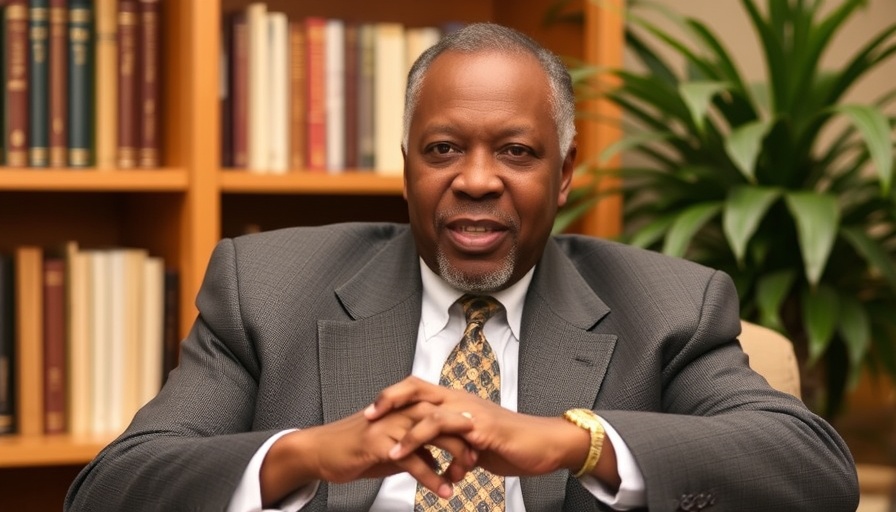
Michael Thurmond's Mission: Connecting With Georgians Through History
As former DeKalb County CEO Michael Thurmond embarks on what appears to be a gubernatorial campaign, he is armed not just with political aspirations but also with a compelling narrative rooted in Georgia's history. Though his ambitions regarding the Democratic nomination for governor are unconfirmed, his recent book, James Oglethorpe, Father of Georgia: A Founder’s Journey from Slave Trader to Abolitionist, is proving to be a captivating vehicle for fostering connections with Georgians across the state.
A Journey Through Time: The Incredible Story of James Oglethorpe
Thurmond's efforts have included visiting more than 80 civic groups and organizations, captivating audiences with tales of Oglethorpe's moral journey from slave trader to abolitionist. It all began during a trip to England in 1996, where he was part of a delegation commemorating the 300th anniversary of Oglethorpe's birth. There, he encountered a plaque that referred to Oglethorpe as "the friend of the oppressed Negro," a description he initially found hard to believe due to Oglethorpe's early engagement in the slave trade.
His skepticism was soon transformed into fascination, leading him to spend over 20 years studying Oglethorpe’s life. The crux of Oglethorpe’s transformation into an abolitionist can be traced back to a poignant letter written by Ayuba Suleiman Diallo, a West African man enslaved in Maryland. This letter highlighted the shared humanity that Oglethorpe had overlooked, prompting him to understand that all human beings deserved dignity and freedom.
Listening to His Constituents: A Campaign Trail in the Making
Aside from promoting his book, Thurmond is using these speaking events as a sort of "listening tour," gauging public sentiment about his potential candidacy. During a recent talk at the Carrollton Kiwanis Club, he found a packed room of engaged listeners, reflecting how history can resonate within the present day. It serves as a reminder that the lessons from the past can inform current political discourse.
Thurmond believes that understanding Oglethorpe’s journey is not just a historical exercise but a modern-day imperative. His narrative challenges constituents to reflect on the significance of their own choices and the impact of their leaders, emphasizing the relevance of civil rights and social justice in today’s political climate.
A Historical Parallel: Oglethorpe’s Influence on Modern Governance
Oglethorpe’s legacy offers a lens through which contemporary leaders can strive for inclusiveness and justice. Georgia has always been a melting pot of cultures and ideas, and leaders like Thurmond are tapping into that rich tapestry by promoting a vision that encompasses the moral complexities of history while addressing present concerns. In an age where political divisiveness is prevalent, Thurmond’s campaign approach, rooted in historical context and communal dialogue, presents a refreshing pathway forward.
Embracing Diversity: Why Thurmond's Message Matters
As Georgia becomes increasingly diverse, understanding the contributions of all its residents—historical and contemporary—can help foster unity. Thurmond’s narrative places historical figures like Oglethorpe in a multi-faceted light that encourages conversations around race, rights, and responsibilities. His emphasis on the moral journey provides not just an opportunity for reflection but also potential for action within the state's communities.
Final Thoughts: The Importance of Connection
Michael Thurmond’s approach to campaigning—intertwining history with contemporary issues—highlights the importance of connection. By sharing Oglethorpe’s story, he reminds Georgians of their shared past and the progress that can be achieved when empathy and understanding prevail. Whether or not Thurmond pursues the governorship, his efforts to engage and inspire through history will likely leave a lasting impact on Georgia's political landscape.
As Georgians consider their next steps ahead of the upcoming elections, all eyes will be on candidates who prioritize the voices of their constituents, much like Thurmond's listening tour. Such initiatives can bridge gaps and pave the way for a more inclusive future.
 Add Row
Add Row  Add
Add 




 Add Row
Add Row  Add
Add 

Write A Comment